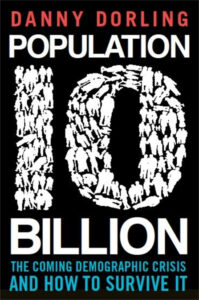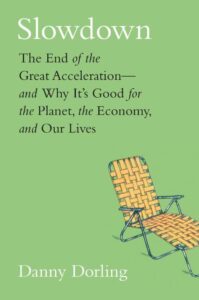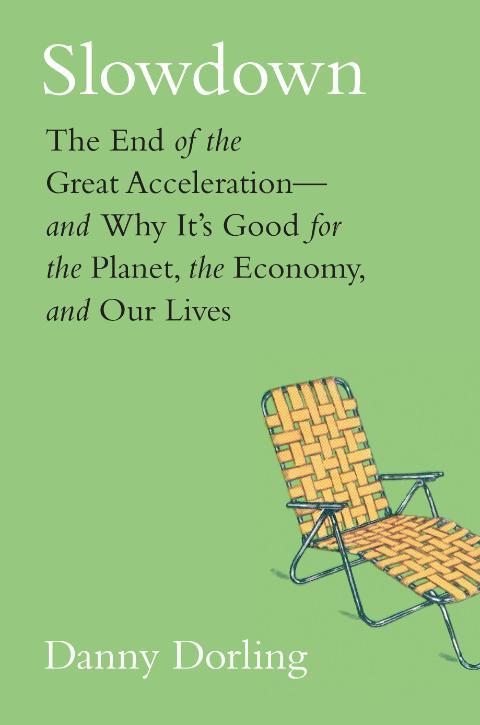Danny Dorling, Halford Mackinder Professor of Geography at the University of Oxford, gave a talk on 14 May 2020 about his new book, as part of the Plotting the Future: Towards Sustainability public lecture series in conjunction with the Geary Institute for Public Policy, Humanities Institute and Institute for Discovery. The talk is available to watch online.
Danny’s book, Slowdown, is an evidence-rich picture of human history and global social change, arguing that growth of all kinds around the world is decelerating and we are heading toward a slower, more stable future. As we exit the period of ‘Great Acceleration’, this slowing down will lead to better outcomes for the planet, the economy and our lives.
With COVID-19 curtailing his book tour, Danny has been grounded in Oxford, where he lives, which is perhaps apt given the subject matter of Slowdown. Caitriona Devery caught up with him over a (leisurely) Zoom call to get the lowdown on the book and his thoughts on the pandemic.

Professor Danny Dorling
Halford Mackinder Professor of Geography
School of Geography & the Environment
The University of Oxford
Profile
Q: You mentioned that you have had your promotional tour cancelled because of Covid, how are you feeling about that?
A: Yes, I should have done 30 talks by now. I’ve had so many flights cancelled. I almost ended up stuck in the US. But it’s made me think, in terms of promoting a book, flying and talking to 50 people in America was a stupid idea. We did loads of stupid things before this. We have become adrenalin junkies. I would say yes to thing all the time. We just didn’t need to do quite as much as we were doing. Right now, you’d love to do one tiny amount of what you used to be able to but enjoy it more.
Q: Do pandemics offer us opportunities into how our societies work?
A: In the book, I look (very briefly) at the 1918 pandemic, and there are other epidemics in there. In the past, they’ve only had very short term effects because the big epidemics have coincided with acceleration. During the 1918 flu there was a 14% drop in GDP but then a 16% rise the year after. Almost as if it never happened.
The 1918 flu, by the way, is well over 10 to 100 times worse than that we’ve got now (in terms of final death toll). Even with revised down lowest estimates, it killed 17 million people worldwide (that is the low estimate). Currently we are only looking at 200,000 – which will rise; but possibly but maybe not reach a million worldwide, so around the size or maybe smaller than the 1968 pandemic, or the 1957 pandemic. What I’m trying to say is previous pandemics have not had a huge effect on our way of thinking, unless you go back to the Black Death.
it is entirely possible for the UK that fewer people may die this year by December than the year before, with prevented deaths, less road traffic accidents. And we are suddenly caring about old people in a way we hadn’t done before. We were letting old people die at an incredible rate. We had falling life expectancy for the last three years in Britain. We had 120,000 people die prematurely because of austerity and poverty. But this could happen to us, and suddenly we care.
Q: If the threat is low compared to previous pandemics, why has the response been so strong?
A: I think there’s a great underlying sense of insecurity, about everything. There is a sense of growing insecurity in the world, economic insecurity, insecurity about politics, migrations, rising racisms, around the corner is the end of the world. And then you hit this, something we don’t know. The experts disagree on how it works, there are conflicting reports around the world. The 24 hours news cycle really ramps it up.
Most people don’t think about death. It’s normal not to. This has made them think about dying. It’s the first short sharp shock pandemic since 1968. This is new and to be fair to people, there’s no reason why this couldn’t have been as bad as that 1918 flu, had a mortality rate 10 to 100 times higher, and we didn’t know in the beginning.
But there is something weird going on, I don’t get it. The figures come out in the UK on each Tuesday. 19 people under the age of 25 have died in England and Wales since early March according to the most recent release (at the very end of April) – that number is tiny in pandemic terms. We’ve closed all our university campuses, for the smallest possible threat to the health of students that you can possibly measure. I could be wrong, but people like me who think like this, we don’t use the word ‘tiny’ publicly because the sensitivities are so high.
You’ve got to ask, how come we were in a situation of so much potential frenzy, why didn’t we plan better and control the spread at first better and then behave a bit more like Sweden? This is a G7 disease, the vast majority of deaths are in the richest countries in the world. The ones with an elderly population, the ones who can afford to test. I’m not complaining about this, in a way it’s a really good early warning for what a bad pandemic, a pandemic like 1918, might be like – which this is not at all like. At least we’ll be prepared.

“In demography you have this great big acceleration (worldwide) from 1800 onwards, there are more and more people in the world every year, a faster rate of growth every year, unparalleled explosion. There’s no period in human history that’s ever had anything like this. Then bang, 1968, (or possibly 1971) the explosion peaks at 2% growth, it kind of shudders to a halt”
– Prof. Danny Dorling
Q: Tell us about the genesis of this book and how it links to your previous work?
A: I wrote a book about seven years ago, called Population 10 Billion, which was about demography and how the planet was changing. There’s a little bit in that book, about 300 pages in, about how the rate of GDP had slowed down each decade. After writing that book, I wondered, what else is slowing down. I assumed that very roughly half of the things we were interested in would be slowing down and the other half speeding up, things like student debt, innovation in computers. The reason this book came about is that I kept on finding things slowing down. Although I was working after the 2008 crash, which might explain some of the slowdown I was seeing, I then started to look back over decades. It changed what I thought was happening. I looked back and saw there was a time when it wasn’t, the 1930s to 1960s, and tried to step back further again.
In demography you have this great big acceleration (worldwide) from 1800 onwards, there are more and more people in the world every year, a faster rate of growth every year, unparalleled explosion. There’s no period in human history that’s ever had anything like this. Then bang, 1968, (or possibly 1971) the explosion peaks at 2% growth, it kind of shudders to a halt. Now we’re just about to go below 1% growth a year, and we’re heading rapidly probably within fifty or sixty years, to human stability (to 0% growth and then a small decline in our numbers). I’m not the only one, loads of demographers pointed this out. All I did that was different was measure more things than most people measure; not just human numbers and predictions but much else about us and what we do.
“By focusing on environmental limits instead of on the social strategies that enable better environmental and social outcomes, we fail to engage the only force of nature that can help us: human aspirations”
– Prof Danny Dorling

Q: The UN recently revised its population projection downwards. It seems like demographic projections for future human populations are decreasing generally.
A: On the day that that my Population 10 Billion book was published in 2013, the UN actually revised its estimates upwards to 11 million. But they made a mistake, ignoring the effect of a baby boom. There’s a huge degree of error in all such projections. Last year their estimates were revised down, yet again. There are quite a lot of recent papers, saying the UN may have gotten it wrong, it’s going down even faster than we think.
The big shock is that in the poorest countries in the world, where women are dropping from having 5 or 6 babies to 3 or 4, in just one generation. It’s the spread of knowledge, the speed of that. There’s no reason why countries have to go through the same path that Ireland and England went through. It can happen in one generation. We have a stupid idea, a quite arrogant idea, that comes from early Development Studies, that we are superior, we did it first and everyone will follow us. It’s the same in how men and women treat each other. 100 years ago, women were viewed as subhuman. The idea that everywhere will take the same amount of time for fertility falls to drop to three and two and fewer children per mother is foolish.
Q: Tell us about slowdown and its impact on inequality
A: Inequality kind of peaked in 1880s and 1890s and then again in 1910s and 30s, worldwide. At the time of greatest acceleration you get the greatest inequality. Things are changing, money is being made, and there are some people who are greedier than others, that’s the way I put it. When things slow down, that’s much harder. You’ve got to tell people ‘oh I still deserve to have all this cash even though you’re getting poorer,’ that’s tricky. When things are accelerating you can lie to them and say ‘oh your grandchildren will be rich’.
The pandemic is useful for explaining. Yes, the initial damage is greatest for people who are poor, but wealth is literally evaporating. One third of the value of stocks and shares is gone. Similarly with housing, we keep on trying to make people pay more and more money for housing. You have to fool people that even though there are less people and more houses than we could ever need, for some reason you’ve got to pay a fortune for this house. Eventually that always breaks down.
It’s not about some kind of theory. This is just what happens when you have an economic slowdown, like what happened in Japan. There’s a lovely quote from Owen Jones about Japan, where he found some statistics that said there are fewer millionaires in Japan than in the Barclay’s bank tower in Canary Wharf. We call it Japan’s two lost decades but Japan has a high life expectancy, very high quality of life, low rate of crime, low inequality and much less accumulated wealth than in UK or US.
Q: How does this economic aspect link with better environmental outcomes?
Thomas Piketty found one. He found that the most unequal societies, like the US, needed four planets to sustain consumption levels whereas Japan only needed two. That’s still two, but the difference is dramatic. In more unequal countries the rich pollute and consume more but the poor do as well. Inequality dramatically increases environmental damage. It’s people trying to behave normally, and in the US to behave normally you need a car. You need to buy things because other people buy things. In a more equal country there is less conspicuous consumption.
Planet of the Apes (1968)

Q: In recent years there seems to have been an explosion of anxiety and insecurity around the future, predicting a very different world than in Slowdown. What do you think about those kinds of dystopian worldviews?
A: I haven’t been able to find an increase in dystopian thinking. In the book, I quote the ending of Planet of the Apes where Charlton Heston says ‘You maniacs! You blew it up! Damn you! Goddamn you all to hell!’. That was 1968, there was an awful lot of dystopian thinking in the 1950s and 1960s at the height of the population explosion, and the realisation of nuclear weapons. We mustn’t get ourselves into thinking we are in a particular era of dystopian thinking. It’s possibly less. It’s very hard to measure.
We are slowly coming out of an era of thinking it’s all going to end, and slowly moving towards people talking about ways of being sustainable. But we are programmed to worry. We ought to be celebrating the slowdown in the numbers of people, and we actually know quite a lot of things about sustainability and about the environment.
Q: Accumulation, profit, growth, are core values in Western culture and central to capitalism. Will slowdown be geographically uneven – impacting more on the west?
A: I think they are particularly central to the cities at the heart of all of this. There’s a lovely statement made by Rene Descartes from the 17th century, standing on the dockside in Amsterdam and he said, ‘all about me is madness’. Amsterdam was the first centre of this world economy. Then it moved from to London then to Manhattan. At the very heart of this world, particularly of the Dutch and the English and the US, this was seen as absolutely essential. But the periphery, even of those countries, you can find much slower ways of being, and scepticism for what they do in London.
It does look very western, but the UK invaded something like 170 of the 193 current members of the UN so there isn’t much that hasn’t been in some way Westernised. The US sells Coca Cola and jeans in all but four countries in the world very effectively. Particular ways of thinking did spread. Maybe I live in a bubble, but I see scepticism of growth all around me. I watched the rise of Greta, one teenage girl, repeating the same thing many times. Nobody is standing up against her saying growth is great.
It is Western, but it’s coming to an end. I’m being a bit trite, but this was a thing that happened, that began on the dockside in Amsterdam, required a religion that allowed you to behave in this way, allowed you to make profit, allowed you to treat other people badly, Christianity, and Protestantism Christianity, allowed usury to occur, that saw the accumulation of riches as good, that saw inequality as good, saw different people as having different value, lots of quite nasty values within that.
Something like this began in the 12th and 13th century in China and then stopped. A lovely little explosion of early iron and even steel making. China could have had an industrial revolution and this could have all happened several centuries earlier. There was nothing intrinsically special about what happened in Europe. It was the arse end of nowhere before this. It was only arriving to the Americas in 1492 that suddenly put Europe in the centre of the world. Diseases allowed Europeans to take what they wanted from the Americas. We end up being the richest part of the world based on where currents took a ship. The problem is we taught ourselves such a superior story of us. We told ourselves the story of superiority because you can’t operate a giant slave trade without telling yourself that you’re better.
“I think universities need to move towards the idea that you’re preparing people for a life which will be slower, and do less, but most importantly of all, you’re valuable. It’s really hard to tell someone who has left education at 21, that you’re stupid and you can’t think for yourself. Increased access to education was very important for the growth and spread feminism (and of course in turn drive that growth). Wider access and participation change the idea that you’re special because you’re a graduate.”
– Prof Danny Dorling
Q: There’s a quote in the book about the need for strategies to address the challenges identified by science. ‘By focusing on environmental limits instead of on the social strategies that enable better environmental and social outcomes, we fail to engage the only force of nature that can help us: human aspirations’. Can you tell us a bit about the need to change human aspiration, and what universities can do in this space?
A: It’s trying to change the aspiration. A key aspiration that we did have which was how can we create a business, how can you make money, how can you become richer, become a wealth creator. In a slower world, we will still have businesses, but the idea that they’re going to get bigger and bigger Is gone, you can aspire to working at better ways of cultural change.
I think universities need to move towards the idea that you’re preparing people for a life which will be slower, and do less, but most importantly of all, you’re valuable. It’s really hard to tell someone who has left education at 21, that you’re stupid and you can’t think for yourself. Increased access to education was very important for the growth and spread feminism (and of course in turn drive that growth). Wider access and participation change the idea that you’re special because you’re a graduate.
Q: What kind of political structures and systems might work in this new reality, since so many of current ones are bound up with capitalism, fast pace, growth?
A: Look at the countries that are doing best in the pandemic, New Zealand, Finland. It’s young women politicians. Finland is run by a coalition of five women. Look at Portugal. Young left and green, across most of Europe. It will be a politics which involves a wider set of people and is politer. There’s also a scepticism that we often hear when you say that somewhere is ahead of other places. People often, almost always, see almost nothing to admire in the country they are in. If you go to Norway or Finland and say you’re doing really well, they’ll list everything that’s really bad. Which is perhaps why they’re doing really well because they’re constantly worried about what they’re not doing.
If you go to a country which is doing really badly like the USA, or even the UK, the most unequal country in Europe, in countries like this, you more often hear people say ‘we’re the best’. There’s a kind of inverse relationship between people’s sense that politics is working and how it works. I imagine a politics that is sceptical, talking, engaged, never quite happy, rather than this ridiculous, patriotic, jingoistic politics of the past, which still exists in some places.
Q: It sounds like slowing down is a kind of growing up?
A: Yes, it is in a way. We’ve only gone through six generations of this. We get terribly disappointed with ourselves, we have this idea that we are superhuman, but these changes are – if you step back – these changes are huge. It has altered very quickly, what we know and what we expect. Things like believing that our betters really were cleverer. A lot of people in England will think if you pay £35,000 a year to go to Eton that must make you very clever. But more and more people are sceptical of this idea that there are a set of people that are very clever. It takes confidence not to believe in an elite and to believe you can work it out for yourself – that you are not inferior.



